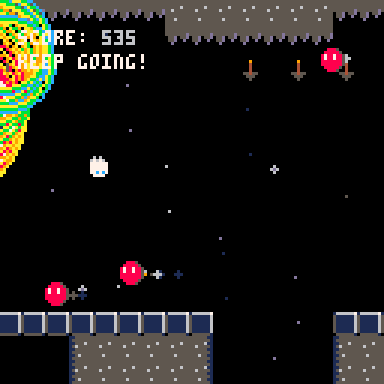Flashing lights and loud noises dominate your senses. Last quarter. This time you’ll get it for sure.
You pop it in and the screen comes to life. Dirk the Daring fearlessly gets to his heroic work. You use what you’ve learned all afternoon to navigate the treacherous path. It’s a perfect run so far. Just as you’re starting to get cocky, the Lizard King creeps out of nowhere. Game over.
Just one of many horrible fates that befell Dirk the Daring.
Totally defeated and having lost your last quarter, you start to slink away from the machine. Almost automatically you sweep the coin return with two fingers – A quarter! Maybe one last game of Ninja Gaiden instead of trying your luck at this one again.
The Golden Age of the Arcade
If you were born before the 90s, chances are this sounded pretty familiar to you. All those of us who grew up in the time when the arcade was king distinctly remember those last quarter feels, or the sensation of poking at the coin return in the hopes that some other kid forgot their last coin in it.
Yes, arcades are still a thing. My daughter is quite fond of them. It’s hard to take her to a half abandoned and dilapidated arcade though and not have my mind drift to those days where games meant more than just tickets. When the arcade was the spot to be all summer long.
Back then, the video games we could play at home were limited. Sure, depending on what decade we’re talking about there were Ataris, Commodores, NES and eventually even those late 90s persistent 300+ game shareware discs. The quality and quantity of games you could play from your couch, however, paled in comparison to wall to wall arcade cabinets and the sure chance of finding at least some of your friends at the arcade.
These were the days of no internet. The days of very limited multiplayer outside multi-joystick arcade games. The days when gaming culture was born… and that culture lived full-time at the arcade.
Dragon’s Lair, which I was referencing above, came out in 1983. Dragon’s Lair BLEW OUR MINDS! This was a time when most games were lines and dots on a screen, or at best they were made up of moving static images. Some of the highest tech out there had sprites for characters that had 2-3 poses at most.
Dragon’s Lair showed up with a Disney-quality, rotoscoped movie as its gameplay. They used the entirely new LaserDisc data format to encode a movie with multiple branching paths… one of the first examples of interactive media at this quality! It was impressive… so impressive, in fact, that sometimes you’d keep draining quarters into it even after you realized how punishing and impossible it was.
Not So Distant Beginnings
We’ve come a long way in a very short time with video game tech. The glory days of the arcade weren’t that long ago. Looking back, however, it’s really no wonder why we moved so fast. At the arcade, you could play 40+ new games in one day, talk about them with your friends, and watch hundreds of other kids playing (who were probably better than you) over their shoulder. We learned quick, which is why gaming learned quick.
Simple shapes and basic mechanics of games like Breakout gave way to slightly less simple shapes of games like Arkanoid. One by one, the kids pumping quarters in the games started to recognize genres and core mechanics. At first it was “Oh! It’s like Double Dragon”, but as our knowledge grew it quickly became “Oh! It’s a beat ’em up, co-op platformer”.
Arcades were education. In those early days of the 70s and 80s, there were great game designers and programmers working on games. That was nothing compared to the kids they were training up though. No one had ever absorbed so much of the previously non-existent media of video games.
Spoiler, some of us who put our time in at the local arcade ‘studying’ would go on to push gaming forward with this education. Soon the kids recognizing patterns in the games they pumped their quarters into grew into the young professionals propelling gaming into the next generation.
The Legacy of Arcades
Arcades may still exist, but they’re not always the bastion of culture they once were. That having been said, that culture is still very much alive. When my daughter used to lure three friends into her Minecraft world so they could run her newly created obstacle course, that felt very arcade. When I watch a Twitch stream and think my commentary actually adds to the group conversation, that feels a lot like crowding around the arcade champ’s shoulder while they’re taking challengers on in Killer Instinct.
I think you’d be hard pressed to find many who work in game dev today that don’t have fond memories of the arcade. This was the shared experience that helped raise us and led to the rapid progression of games through the past few decades. Whether you were setting your coins on deck for Space Invaders in the late 70s or trying to solo run The Simpsons Arcade Game in the early 90s, you helped create this industry.
There are cultures throughout the world where arcades still hold some of their former glory. Japan, notably, has sprawlingly huge arcades with an often ridiculous assortment of all kinds of games. Even those, however, are on the decline compared to their heights in previous decades.
 Pictured: The Kabukicho pedestrian crossing in Tokyo, at the corner of Shinjuku Moa 2 Avenue and the Godzilla Road.
Pictured: The Kabukicho pedestrian crossing in Tokyo, at the corner of Shinjuku Moa 2 Avenue and the Godzilla Road.
Though arcades are statistically on the decline in Japan, there are still whole districts with entire buildings devoted to nothing but arcade games.
Luckily, one thing out there is preserving the classic arcade feel… And I’m not talking about a room full of machines that dispense tickets so you can buy worthless prizes. That great force working to save some piece of this culture is probably the same thing that made you read this far – nostalgia. Adults love games too, and over the past decades we’re seeing far more arcades formatted for grownups.
It’s really no surprise that these ‘barcades’ have risen so quickly. Adults do love to play just as much as everyone else. Billions of people out there all have this shared experience of the arcade… is it any wonder we’d want to relive a little of that? Also, compared to the price of some leisure activities out there… my wallet and wife would much prefer I play some Ms. PacMan with a cheap beer in my hand for an hour or two rather than some of the alternatives.
Fun is fun, and arcades are fun that everyone can enjoy together.
Arcade Culture Comes to GalaChain
This long, nostalgic ramble has finally brought me to the point. Those of you who have been around the Gala Community for a while may be aware of the Happy Valley Arcade Bar in Beacon, NY. The owners of this establishment have long been incredibly supportive and involved community icons across all things Gala… and they’re working on something absolutely amazing for all arcade fans.
https://www.happyvalleybeacon.com
They are currently building some of the world’s first web3 gaming cabinets. These arcade machines will connect to GalaChain and reward high scorers with $VALLEY. Eventually, these games may be playable on the PC, but the arcade cabinets is where the bulk of these tokens will come from.
 Early footage from one of Happy Valley’s arcade games!
Early footage from one of Happy Valley’s arcade games!
We here at a Gala are a bit on the outside looking in on this one, but I personally am VERY excited. Not only is it amazing to see people doing new and innovative things with GalaChain, but I really like the idea of a worldwide arcade high score battle.
Information will be coming out soon from the Happy Valley team. I hear they are planning to sell arcade cabinets with $VALLEY potential among other things.
You don’t have to take my word for it though… head on over to https://discord.gg/5zJ8WqNV to join their Discord server today!
See you at the arcade!!!
FAQs
Q: What types of games were popular in the arcade?
A: Games like Dragon’s Lair, Space Invaders, and The Simpsons Arcade Game were popular in the arcade during the golden age.
Q: How did the arcade culture influence the gaming industry?
A: The arcade culture played a key role in shaping the gaming industry by introducing new genres, mechanics, and gameplay experiences that influenced future game developers and professionals.
Q: Are arcades still popular today?
A: While traditional arcades have declined in popularity, there is still a nostalgic appeal and dedicated fan base that keeps the arcade culture alive in various forms, such as barcades and innovative arcade experiences like web3 gaming cabinets.
Credit: news.gala.com


